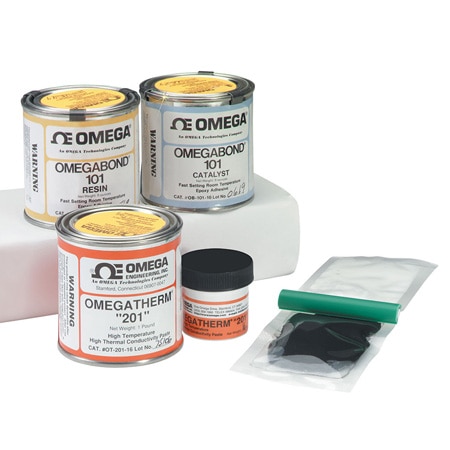Your feedback matters, take a quick surveyWebsite feedback

| Quantity | Price each |
|---|---|
| 1-9 | $116.66 |
| 10-24 | $110.83 |
| 25-49 | $108.49 |
| 50-99 | $103.83 |
| 100-199 | $101.49 |
| 200+ | $99.16 |
this product is temporarily unavailable.
Edit these specs to order a different model. Not all combinations are valid. Options compatible with previous selections will be in bold.
*Highlighted options are not compatible. Please select a different combination.
OMEGABOND™ epoxy and OMEGATHERM™ thermal conducting paste are easy to use epoxies and silicone products. They are specially formulated for permanent bonding of thermocouples, thin film RTDs, thermistors and other temperature sensors, to most surfaces–metals, ceramics, glass, plastics, paper products. OMEGABOND™ and OMEGATHERM™ products are compounded and packaged for convenient, easy mixing and application. Each formulation exhibits important characteristics necessary for accurate, fast, reliable temperature measurement. These are: good adhesion and strength, high temperature rating, high thermal conduction, high electric insulation, thixotropic consistency, fast cure, and easy application.
OB-100 is available in 1/4 oz or 1 oz Twin Packs and 1 lb as 2 cans, 1 of resin and 1 of hardener.“Twin pak” packaging is supplied to ensure the user with accurate proportioning of resin and catalyst, as well as to provide a clean, fast means of mixing. The “Twin Pak” is a flexible, transparent plastic pouch, separated into two isolated compartments by means of a removable external divider. In one compartment is the resin, the other the pre-measured catalyst. To use, remove the divider, mix the two components by kneading the pouch, then snip off a corner to dispense. Each “Twin Pak” comes with an instruction sheet, enclosed in a clear, heat-sealed plastic envelope.
Please note that once mixed, the OB-100, OB-101 and OB-200 epoxies have the following "Working Times" (also referred to as "Pot Life"):
OB-100: Less Than 8 Minutes at Room TemperatureSpecifications are subject to change without notice. Suitability of this product for its intended use and any associated risks must be determined by the end customer/buyer in its final application.